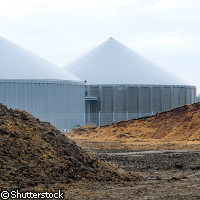Up with biogas, down with petrol
What do you think is more toxic to the environment? Petrol or biogas? New research from Sweden shows that petrol is more harmful since biogas from refuse generates 95% less greenhouse gas emissions; previously the figure was thought to be 80%. Giving an even stronger edge to biogas is the revelation that a few tweaks to biogas plants could boost this level to 120%, rendering biogas more than climate neutral. Researchers from Lund University in Sweden analysed a biogas plant in Scania on behalf of the Swedish Energy Agency to determine production emissions. The analysis performed at this plant will help researchers to further investigate and optimise other biogas facilities. Sweden is home to around 20 facilities that generate biogas earmarked for the automotive industry. According to the researchers, the biogas output from these plants is as great as that from sewage treatment works that use sewage sludge. 'The plant we have studied is fairly representative of an average biogas plant that processes waste and manure. In our study, we have calculated emissions for the entire production chain and included both direct and indirect emissions,' explained Mikael Lantz, a PhD student in Environmental and Energy Systems Studies at Lund University. 'What is particular to our study is that we have included indirect factors that have not previously been taken into account, for example how the ground is affected when mineral fertiliser is replaced with bio-fertiliser,' he added. 'In addition, methane leaching from the plant is measured and not based on standard data that is often otherwise used in this kind of analysis.' The study found that biogas releases 16 grams of the greenhouse gases methane, carbon dioxide (CO2) and laughing gas per kilowatt hour of biogas. Compared with petrol, these emissions are some 95% lower and more optimal than the standard values that are being used today. The team suggested that the biogas could become even friendlier to the environment if wood chips were used to heat the facilities that produce the gas. Also, this method may be even better for the producers' pockets in the long run. 'Another suggestion is to cover the bio-fertiliser stores to reduce the losses of nitrogen and reduce dilution with rain water,' Mr Lantz said. 'The plant has already implemented this measure. By using a few other recommendations as well, the emissions can be reduced to 120% lower than petrol, without increasing the production costs by more than a couple of [Swedish] öre [equivalent to a fraction of a euro cent] per kWh of vehicle gas.' Europeans are more aware than ever of the problems that are impacting the environment. Experts believe that biogas could benefit myriad sectors, especially agriculture. Not only would biogas give fertilisation efficiency a boost, but farmers would benefit from bigger savings. We now know that biogas produces fewer greenhouse gas emissions, and that it is a cheaper alternative. The experts also point out that biogas generates fewer odours and attracts fewer pests. With the EU calling for a reduction in CO2 emissions by no less than 20% in the next decade, biogas seems to be a viable energy alternative. Experts note that biogas can be used for combined heat and power production, and transportation fuel. It can also be integrated in the European gas grid.
Countries
Sweden



